A masters in pharmaceutical sciences is a graduate degree for those who are interested in the development, manufacture, and promotion of pharmaceutical products.

In this degree program, you can become more knowledgeable about the drug development process, the mechanisms by which medications work, and the business of pharmaceutical sales.
Editorial Listing ShortCode:
Through online study, you can earn your M.S. in Pharmaceutical Sciences and prepare for the next step in your career. Whether you’re interested in drug discovery, product development, quality control, or sales, this degree could be a key move toward your goals.
Online Masters in Pharmaceutical Sciences Programs
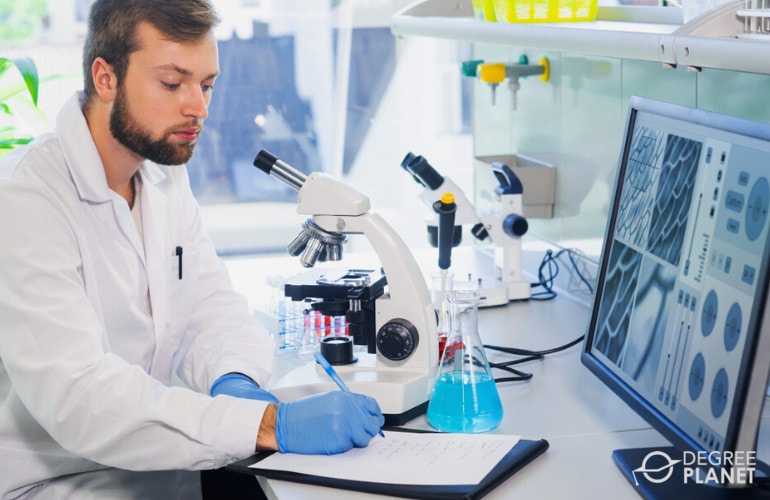
If you’re a science-minded person with a desire to change lives through medical innovations, then you might consider studying pharmaceutical sciences at the graduate level.
In this field, you’ll focus on the science of medication. You can learn how drugs work in the body to fight diseases or reduce symptoms, and you’ll explore methods used in discovering new medicines and bringing them to market.
As the name implies, this degree program involves a large amount of science coursework. Disciplines you may study include:
- Biochemistry
- Epidemiology
- Immunology
- Organic chemistry
- Physiology
- Toxicology
Because of the science-heavy nature of this program, it’s beneficial for you to have studied science at the undergraduate level.
Editorial Listing ShortCode:
Many colleges require applicants to hold a bachelors degree in chemistry, biology, or a similar field. Others look for applicants with professional experience in the pharmaceutical industry or a related line of work. To refine your studies, you may choose a concentration track. You might be interested in specializing in drug development, pharmacology, healthcare analytics, biomedicine, or another branch of this field.
The specialization you choose could prepare you for a particular type of pharmaceutical work. These degree programs often require 30 to 45 credit hours. The longer programs may have a thesis component, but some schools have you do a major capstone project instead of writing a thesis.
As with an online masters in pharmacy, you can also earn a pharmaceutical science masters online. Some programs may be available through fully online study, while others have short on-campus components for the degree’s lab requirements. It’s helpful to keep in mind that this isn’t a degree for becoming a pharmacist. Rather, it’s a field of study for those who want to bring pharmaceutical products to market.
People who earn a master’s degree in this field may work as medical researchers, chemists, quality assurance professionals, and regulatory agents. They might also head up pharmaceutical marketing or sales.
Common Online Master’s in Pharmaceutical Sciences Specializations
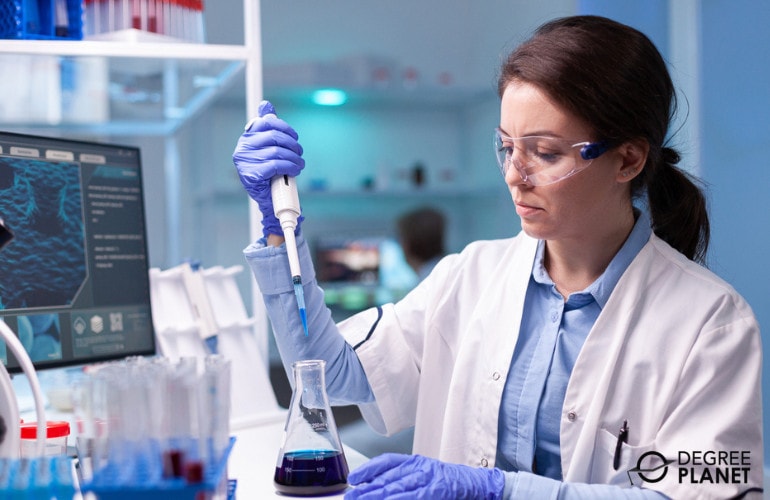
Where do you want to focus your attention as a professional in the pharmaceutical industry? Knowing that can help you decide what specialization to pursue during your master’s program.
Specialization tracks are designed to give you advanced training in a specific area of your field. Common specializations include:
- Delivery Systems. Studying nanotechnologies, pharmacokinetics, metabolism, and biotechnology can help you become an expert in the area of drug delivery.
- Drug Development. If you want to be involved in discovering and developing new pharmaceutical candidates, you’ll likely study organic chemistry, molecular biology, and assay testing.
- Pharmaceutical Manufacturing. For a career in industrial pharmaceutics, you might take classes on drug testing, quality control, regulatory compliance, raw materials, and drug delivery methods.
- Pharmacoeconomics. A program focused on pharmacoeconomics will help you merge scientific knowledge and business principles so that you can make strategic decisions about drug pricing and the costs of research and development.
- Toxicology. As you study systems toxicology, you might work with data and mathematical models to predict the outcome of exposure to medications or other substances and to improve the safety profile of these products.
This is just a small sampling of the many concentration tracks offered by various pharmaceutical sciences colleges. The availability of a certain concentration track may factor into your decision about which school to attend.
Pharmaceutical Sciences Careers & Salaries
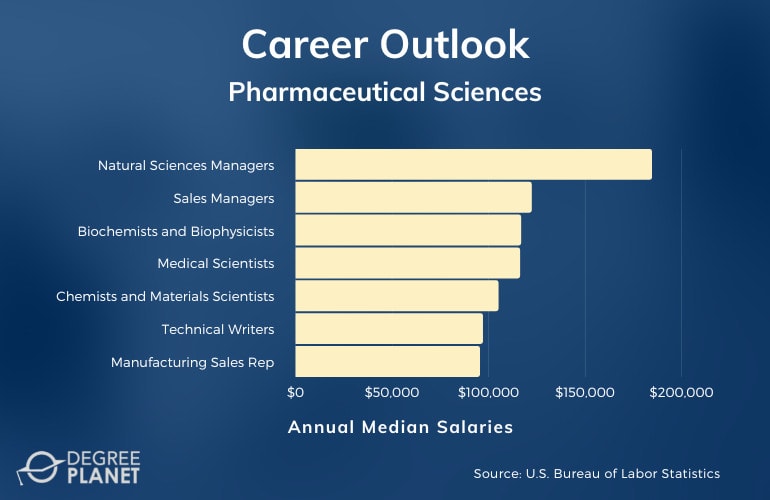
When people hear that you’re going to study pharmaceutical sciences, they may automatically assume that you’re planning to become a pharmacist. That’s not the main focus of this master’s degree, though.
In fact, working as a pharmacist in the US requires a doctorate, such as an online Doctor of Pharmacy, so an MS in Pharmaceutical Science isn’t usually a step in the process. Rather, a graduate degree in pharmaceutical science focuses on the parts of the pharmaceutical industry that take place before a product ends up on a pharmacist’s shelf.
People in this field often work in drug development and testing. Pharmaceutical companies and research firms are possible employers. Potential job titles include chemist, biochemist, or medical scientist. If you need to start at the entry level and work your way up, you may begin as a lab technician.
Editorial Listing ShortCode:
The more education you get, the higher you may be able to advance in your organization, but a masters degree is sufficient for many employers. Eventually, you might work as a manager over a team of scientists. According to the Bureau of Labor Statistics, here are the median salaries of some of the positions related to the study of pharmaceutical sciences.
| Careers | Annual Median Salaries |
| Natural Sciences Managers | $137,900 |
| Sales Managers | $127,490 |
| Biochemists and Biophysicists | $102,270 |
| Medical Scientists | $95,310 |
| Chemists and Materials Scientists | $79,760 |
| Technical Writers | $78,060 |
| Wholesale and Manufacturing Sales Representatives | $62,890 |
| Forensic Science Technicians | $61,930 |
| Biological Technicians | $48,140 |
| Quality Control Inspectors (Professional, Scientific, and Technical Services) | $46,280 |
Hiring requirements vary among employers, and some of these roles require a doctorate. Not every job with a pharmaceutical company involves a science title. You could also work in a different department, such as quality control, regulatory compliance, or sales.
You may find that your knowledge of chemistry is relevant to many other industries as well. For example, some graduates become involved in product development or quality assurance for a different type of manufacturer. Others work as forensic scientists. Their responsibilities might involve analyzing the illegal substances involved in crimes.
There’s also a demand for skilled writers with a science background. Some pharmaceutical professionals produce scientific articles or write medical marketing pieces for drug companies.
Master of Pharmaceutical Science Curriculum & Courses
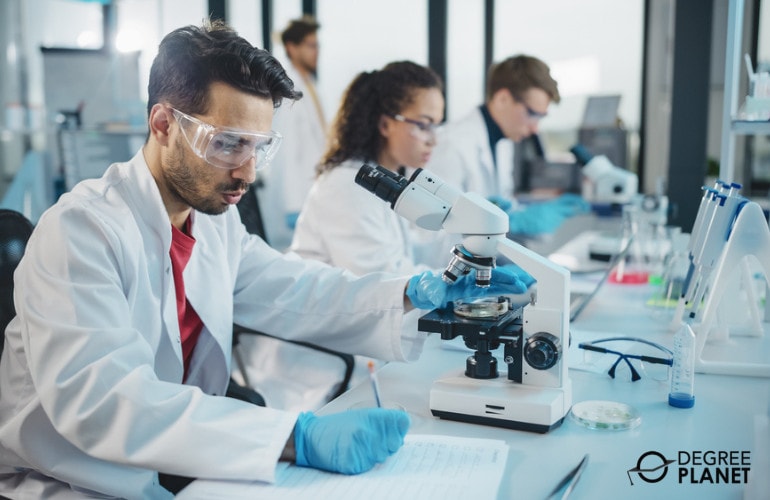
If you want to pursue a career in pharmaceutical science, you can expect to take many science-heavy courses. An assortment of other topics will likely be covered as well. The curriculum at your college might include:
- Animal Research: There might be a class that addresses the benefits, drawbacks, and ethics of testing pharmaceutical products on animal subjects.
- Drug Delivery: You’ll learn the various approaches used for safely and effectively getting medicines into the body.
- Drug Development Regulation: You may spend time reading and discussing case studies as you consider the rules and ethics surrounding pharmaceutical development and testing.
- Foundations of Pharmacology: The graduate program may begin with an overview class that introduces you to foundational concepts and sets the tone for the program.
- Organic Chemistry: Over one or more semesters, you may go beyond the basics of organic chemistry and study organic reactions, peptides, proteins, stereochemistry, organic synthesis, and other advanced concepts.
- Pharmaceutical Experimentation: This class will focus on designing effective studies for pharmaceutical research and accurately interpreting the results.
- Pharmaceutical Finance: You’ll learn about pharmacoeconomics, an area that addresses the financial aspects of drug development and sales.
- Pharmacogenomics: For a masters in pharmacogenomics, you can expect to study the interplay of drugs and genes to explore why people respond to drugs differently.
- Pharmacokinetics: Often referred to in the industry as PK, pharmacokinetics is the study of drugs’ start-to-finish movement throughout the body.
- Physiological Systems: By studying the human body and how its various parts and systems work, you can develop a strong foundation for understanding the role and mechanism of various pharmaceuticals.
You may need to complete 30 to 45 credit hours’ worth of classes before you can graduate with your degree in pharmaceutical sciences. Programs can vary in their coursework requirements.
MS in Pharmaceutical Sciences Admissions Requirements

Pharmaceutical sciences programs often hit the ground running, and new students often need to be able to jump right in.
For that reason, admissions committees pay close attention to whether applicants have the knowledge and experience necessary for success in this program. The required admissions materials may include:
- GRE score (not required by all schools)
- Purpose statement or writing sample
- Reference letters
- Resume with relevant professional experience
- Undergraduate transcripts
Requirements vary, but some schools set minimum GPAs or accept applicants only from certain undergraduate disciplines. For instance, some schools look for applicants who have completed prerequisite courses in calculus, chemistry, statistics, biology, and related subjects.
Master in Pharmaceutical Science Programs Accreditation

Pharmaceutical science is a field that requires a great deal of technical knowledge and scientific ability. Potential employers will want to know that you possess the necessary skill and know-how, and earning your master’s degree from a regionally accredited school is one way to show that.
Editorial Listing ShortCode:
Accredited colleges align with rigorous academic standards, and they’ve proven that they educate students thoroughly. An accredited degree can serve as a sign that you’ve put in the work and have acquired essential knowledge. Employers aren’t the only ones who care about accreditation. So do other schools. Regionally accredited courses are more likely to transfer elsewhere or to qualify you for doctoral programs.
Financial Aid and Scholarships

You may be able to get help with the cost of your pharmaceutical science master’s degree. If you’re interested in learning more about your options, you can start by submitting your Free Application for Federal Student Aid (FAFSA).
Many students finance their degrees with government loans. Whether these loans come from a federal program or your state—or both—they tend to feature lower interest rates than private loans. It might also be possible to get a grant, but those are much less common for grad students.
Scholarships and fellowships can be a promising alternative for many grad students. These could come directly from your college or university, or they might be sponsored by outside organizations. If you’re currently working, you can also check whether your employer offers a tuition reimbursement program.
What Can You Do with a Masters in Pharmaceutical Sciences?
Graduates with a master’s degree in pharmaceutical science might work for a pharmaceutical company, a biomedical company, or a research firm.
Some become scientists who work in drug discovery or development. Other roles might involve making sure drugs are produced safely, economically, and according to government regulations. You could also be involved in sales or marketing.
People with experience as scientists may eventually become natural sciences managers. A masters degree could help you meet the employment qualifications for that role.
How Long Does It Take to Get a Pharmaceutical Sciences Masters Online?
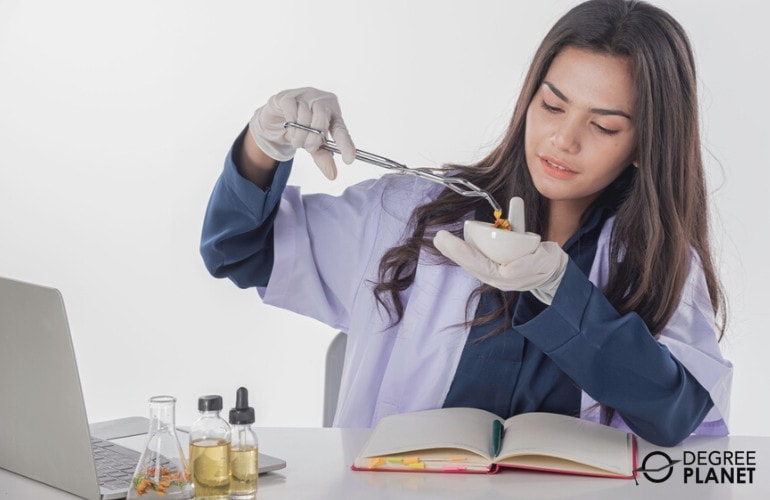
You might be able to earn your pharmaceutical sciences graduate degree in 1 to 2 years of online study. Several factors, though, can influence the overall length of your program.
Editorial Listing ShortCode:
One key factor is whether you enroll part-time or full-time, as part-time programs typically take longer to complete. Another determining characteristic is whether a thesis is required. It takes additional time to do the research that’s involved and produce your paper. Non-thesis programs can often be finished more quickly.
What’s the Difference Between a Master of Pharmaceutical Sciences vs. Pharmacology?
It’s helpful to pay attention to the differences between these two fields before deciding which to pursue.
| Pharmaceutical Science | Pharmacology |
|
|
You might also be able to get a masters degree in pharmaceutical science with a specialization in pharmacology.
Is a Pharmaceutical Science Masters Degree Worth It?
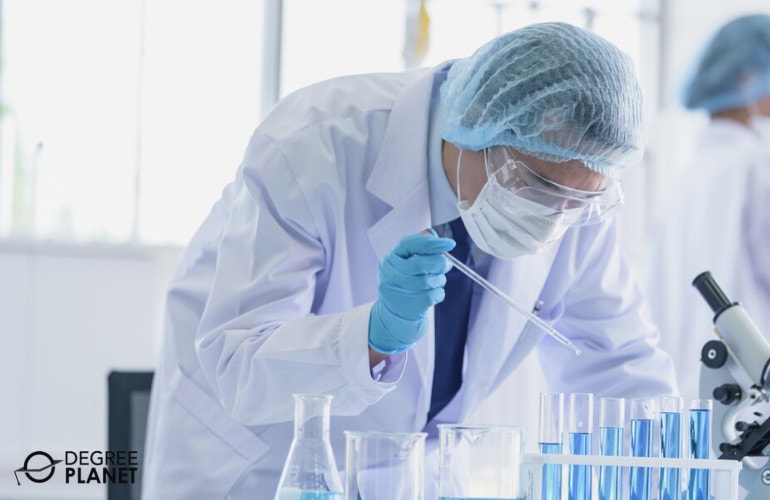
Yes, a pharmaceutical science masters degree is worth it for many students. Your studies in this field might prepare you to make a difference for patients who are in need of a life-saving drug or another medical breakthrough.
Editorial Listing ShortCode:
Plus, job growth trends for many roles in this sector are keeping up with the national average across all sectors. According to the Bureau of Labor Statistics, positions for natural sciences managers are growing at a 6% rate over the next ten years, and 7% job growth is expected for chemists.
Universities Offering Online Masters in Pharmaceutical Sciences Degree Program
Methodology: The following school list is in alphabetical order. To be included, a college or university must be regionally accredited and offer degree programs online or in a hybrid format.

Drexel University offers a Master of Science in Drug Discovery and Development. The program seeks to educate students in the comprehensive process of drug development, from discovery and research to clinical review and post-market safety monitoring. This 38 credit program is housed 100% online and can typically be completed in 2 to 3 years depending on individual student course load.
Drexel University is accredited by the Middle States Commission on Higher Education.

Long Island University offers a Master of Science in Pharmaceutics. The program blends its superior curriculum and faculty with an online learning format with the intent to provide flexibility for busy working professionals. Students can choose to specialize in either Industrial Pharmacy or Cosmetic Science, and the program can potentially be completed in just 14 months.
Long Island University is accredited by the Commission on Higher Education of the Middle States Association of Colleges and Schools.

Mercer University’s Master of Science in Pharmaceutical Sciences program offers a non-thesis option. This option allows students to complete their coursework remotely through synchronous online courses. The degree can typically be earned in 2 years of full-time study. The program seeks students who possess core competencies in statistics, research methods, and science writing.
Mercer University is accredited by the Southern Association of Colleges and Schools Commission on Colleges.

Michigan State University offers a Master of Science in Pharmacology and Toxicology. The program is designed for students hoping to gain specialized knowledge in order to advance professionally in the pharmaceutical field. The program requires the completion of 31 credits. All classes are offered online, helping to ensure flexibility regardless of students’ schedules or locations.
Michigan State University is accredited by the Higher Learning Commission.

Ohio State University offers a Master of Science in Pharmaceutical Sciences program. It aims to teach students how to communicate concepts clearly, plan and execute research, deliver pharmaceutical care, and assess and adjust pharmacy services in healthcare settings.
The program is available as a full-time residential program that can typically be completed in 2 years or a part-time online program that can typically be completed in 3 to 5 years.
The Ohio State University is accredited by the Higher Learning Commission.

South Dakota State University offers a Master of Science in Pharmaceutical Sciences. The program is designed for students who have previously completed undergraduate or professional degrees in chemistry, biology, pharmacy, or related studies. Students can choose between thesis, research, or coursework only tracks, and the 30 to 35 required credits can be completed either online or on-campus.
South Dakota State University is accredited by the Higher Learning Commission.

The University of California—Irvine offers a Master of Science in Pharmacology. The program aims to teach students fundamental principles in the field, the mechanisms of drug action, current topics in pharmacology, and strategies for drug research. All courses are offered online, and the 39 credit curriculum culminates in a 3 credit capstone project.
UCI is accredited by the Western Association of Schools and Colleges Senior College and University Commission.

The University of Cincinnati offers a Master of Science in Pharmaceutical Sciences with a concentration in Drug Development. The program is designed to prepare students for roles in clinical research, quality assurance, and regulatory guidance. It utilizes a 100% online learning format, can typically be completed in 2 years, and offers three start dates for incoming students yearly.
UC is accredited by the Higher Learning Commission.

The University of Georgia offers a Master of Science in Pharmacy with a concentration in International Biomedical Regulatory Sciences. The program is intended for those interested in careers in regulatory management for pharmaceuticals, biologics, medical devices, and veterinary products. Students can transfer in up to 6 qualifying credits from outside institutions toward the program’s 39 required credits.
The University of Georgia is accredited by the Southern Association of Colleges and Schools Commission on Colleges.
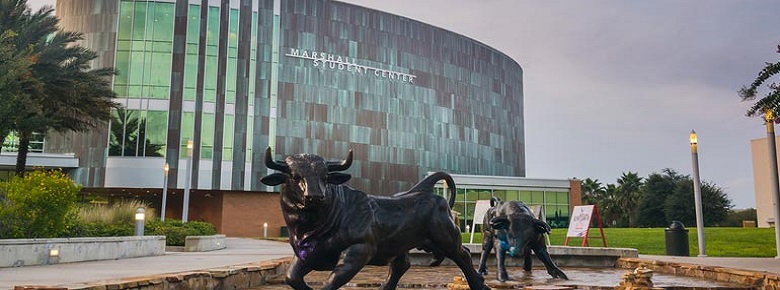
The University of South Florida offers a Master of Science in Pharmaceutical Nanotechnology. Students in the program may choose a concentration in Biomedical Engineering or Drug Discovery, Development, Delivery, and Manufacturing. Classes can be attended online or in-person, beginning in either fall or spring terms. Most students can complete the program’s 32 required credits in 1 to 2 years.
The University of South Florida is accredited by the Southern Association of Colleges and Schools Commission on Colleges.
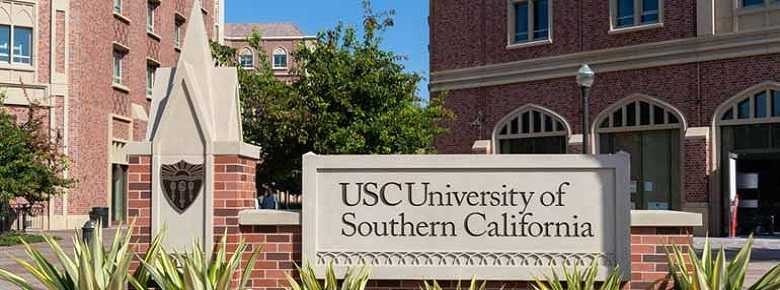
The University of Southern California offers a Master of Science in Management of Drug Development. The program seeks to develop students’ research, leadership, and business skills, with special care taken to equip them for the transition between drug discovery and clinical development. It consists of 32 credits that can be completed on-campus or virtually online.
The University of Southern California is accredited by the Western Association of Schools and Colleges, the Senior College, and the University Commission.

The University of Maryland offers a Master of Science in Pharmacometrics. The program Is designed for students with academic or professional experience in pharmacology, engineering, statistics, pharmaceutical sciences, or epidemiology.
The curriculum covers topics like strategic communication, clinical trial design, and pharmacokinetics and pharmacodynamic modeling. Students can typically earn the degree in 5 to 8 semesters.
UMBC is accredited by the Middle States Commission on Higher Education.

The University of Colorado offers a Master of Science in Pharmaceutical Sciences with a concentration in Cannabis Science and Medicine. The program is designed for students with an interest in emerging cannabis research and treatment. The program consists of 30 credits of pharmaceutical core, cannabis science, and elective courses, all of which are offered online.
The University of Colorado is accredited by the Higher Learning Commission.

The University of North Carolina—Chapel Hill offers a Master of Science in Health-System Pharmacy Administration. The program blends rigorous coursework with invaluable field experiences in order to help students become leaders in the fields of pharmacology and healthcare. Most students can complete the program’s 35 required credit hours in 2 years of full-time attendance.
The University of North Carolina at Chapel Hill is accredited by The Southern Association of Colleges and Schools Commission on Colleges.

The University of Washington offers a Master of Science in Pharmaceutical Bioengineering. The program welcomes engineers, scientists, and researchers employed in biotechnology, pharmaceuticals, and related fields. It is designed as a part-time, online degree program to support working students, allowing them the chance to gain valuable experience in the field alongside their virtual classroom education.
The University of Washington is accredited by the Northwest Commission on Colleges and Universities.
Getting Your Masters in Pharmaceutical Sciences Online

If you’re intrigued by the idea of helping create or market drugs with the potential to change people’s lives, then you might be a fitting candidate for a degree in pharmaceutical science.
This master’s program is designed for science-minded students who have a passion for making a difference in health and wellness. Plus, a busy life doesn’t have to hold you back from pursuing this degree. Online college might be the grad school format that works for you. By studying at an accredited college or university, you can earn an online pharmaceutical degree that’s reputable and recognized by the industry.
You can start checking out top graduate degree programs from accredited schools today.

